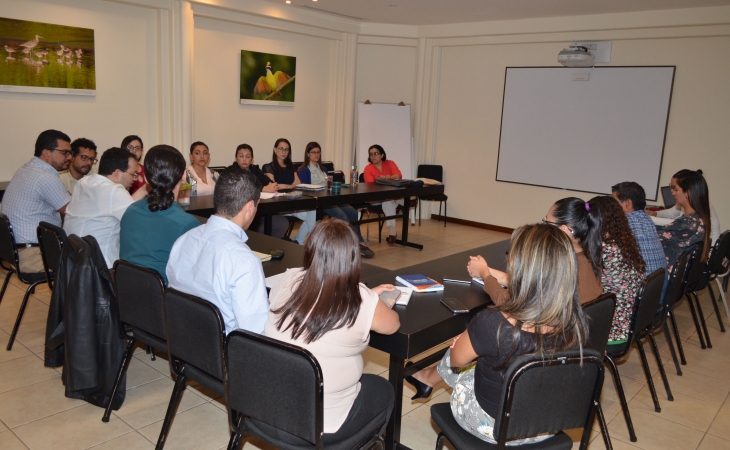Different University of Costa Rica (UCR) research centers carry out research involving the creation of goods that generate productive chains in the country and strengthen the link between the academy, the government sector, and the private sector.

Researchers from INIFAR showed some of the products developed, such as skin lotions, sunscreen and other goods derived from bee hives.
The National Center for Food Science and Technology (CITA), the Research Center for Natural Products (CIPRONA), and the Pharmaceutical Research Institute (INIFAR), all attached to UCR, are part of national working groups created within the context of the project "Strengthening of two value chains with high potential for linkages for SMEs in the Costa Rican Central Pacific Region," which promotes linkage projects that use papaya and honey as raw materials.
This is an initiative led by the Costa Rican Ministry of Economy, Industry, and Trade (MEIC) with the support from the Economic Commission for Latin America and the Caribbean (ECLAC) and the Costa Rica-United States Foundation for Cooperation (CRUSA).
The Costa Rican Foreign Trade Promoter (PROCOMER) and the Knowledge Transfer and Management Unit for Innovation (PROINNOVA) of the UCR and the Ministry of Agriculture and Livestock (MAG ) also participate.
The project started in 2016, and in March and April 2017, dialogue tables were set to choose specific product proposals and create coordinated networks of technical and institutional support to facilitate the development of these products.
Of all the proposals submitted by the different participating organizations, only those from the University of Costa Rica were selected because they were the ones with the highest level of development in terms of studies and research.
As explained by Yorleny Campos-Flores, innovation manager at the Knowledge Transfer and Management Unit for Innovation (PROINNOVA) of UCR, the goal is “to support inclusive growth based on the strengthening of two value chains in the Central Pacific Region, seeking a structural change that leads to a more productive economy, economic escalation, with special attention to the incorporation of MSMEs and the generation of greater and better jobs, meaning social growth. In this case, a study was carried out and papaya and honey by-products were chosen.”
She explained that the ultimate goal is to articulate research, development, and technology transfer activities. To this end, a strategy will be developed to coordinate inter-institutional services through the clear distribution of roles among the participating institutions, thus achieving a political and leadership commitment that will continue and follow-up the implementation of the strategy.
The closing meeting of the project was held at the UCR Vice-Rectory for Research on October 19, 2017 with the UCR research units that participate with the initiative.
The researchers who developed the products met with officials of PROINNOVA and with Leda Peralta, ECLAC representative from Mexico, who exchanged opinions on these finalist products developed at UCR.
Dr. Rosaura Romero-Chacón, researcher at the School of Chemistry and the Center for Research in Natural Products (CIPRONA), showed the products developed by this unit using papaya and honey; among them, hair products such as shampoo, conditioner, and lotion.
Researchers Ana Lucía Mayorga-Gross and Cristina Azofeifa, both from CITA, showed spreadable food products, like jelly, intended for sick or elderly people, and an energizing gelatin-type drink for athletes.
A group of researchers from the Institute of Pharmaceutical Research (INIFAR) created moisturizing skin lotions, one made out of bee honey, another of royal jelly, a third one of propolis (substance made by bees), plus two moisturizing lip balms based on bee honey with propolis.
The project has allowed to establish synergies between the participating research centers and to strengthen the role of PROINNOVA as a transfer channel between academia and the national productive sector.
Of all these products developed, at least ten will be transferred to participating companies or organizations.
These products will be marketed through the natural cosmetics product company Cosméticos Monteverde, Apiarios don Dago, devoted to the primary production of bee honey and beehive byproducts, the Jicaral Businesswomen Association (ASOMEJ), which manufactures beauty products and natural supplements derived from honey. Finally, the Asociación ANCLA company will deal with papaya derived products.
According to Campos, the closing meeting, with the participation of researchers, students, innovation managers, and ECLAC, provided important results.
Among them, the need to continue strengthening the relationship between the University and the Costa Rican socio-productive sector, the convenience of generating synergies between academic units to share good practices of liaisons with external sectors, the utility of the research units being supported by the specialized accompaniment of university instances such as PROINNOVA.
In addition, it was urged to “promote the generation of research and product development in accordance with the requirements of the external sectors, knowing their needs and reality, as well as intensifying the interinstitutional work organized by leaders of working groups, with clear goals and schedules,” concluded Campos.
For more information, call (506) 2511.5835, or write to: yorleny.campos@ucr.ac.cr

The meeting held on October 19, 2017 at the Vice-Rectory for Research, with representatives from the institutions participating with the initiative led by MEIC.
RESEARCHERS, UNITS AND PRODUCTS |
||
|---|---|---|
|
UNIT |
RESEARCHERS |
PRODUCTS |
|
CIPRONA |
Rosaura Romero-Chacón |
Shampoo, conditioner and skin lotion based on honey and papaya |
|
INIFAR |
Gustavo Carazo-Berrocal, Andrea Gómez-Mora, Eleaneth Baltodano-Viales, Marta Porras-Navarro, Rolando Vargas-Zúñiga, German Madrigal-Redondo |
Honey & beeswax -based lotion; royal jelly-based lotion; propolis-based cream; sunscreen lipstick based on honey or other products derived from the hive. |
|
CITA |
Ana Lucía Mayorga-Gross, Cristina Azofeifa |
Jelly-type spread and gelatin-type energy drink for athletes, both honey and propolis-based. |
|
Wilfredo Flores del Valle |
Design for a production plant that uses papaya as raw material. |
|